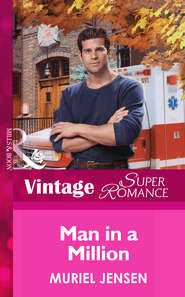По всем вопросам обращайтесь на: info@litportal.ru
(©) 2003-2024.
✖
Second To None
Автор
Год написания книги
2018
Настройки чтения
Размер шрифта
Высота строк
Поля
Second To None
Muriel Jensen
The DELANCEY BROTHERSThree very different brothers. Three very different lives. One great opportunity.What's a tough cop doing in a place like this?Mike Delancey was one of the best hostage negotiators in Texas. But he's left that behind to work in the winery he and his brothers inherited.He was ready for a change, but nothing could have prepared him for Veronica Callahan. Because Veronica and her day-care center represent the two things he swore he'd never have anything to do with again–women and children.Veronica's a woman with a very interesting past–and a detailed plan for the future. Coming to Delancey Vineyards and starting a day-care center fulfills the first part of the plan. The bad news for the extremely reluctant Mike Delancey is: The second part–marriage and a family–involves him!
“I’m here to apologize. I didn’t realize that you...” (#uedc60261-4147-5a1d-b6ea-1083caf886bc)Letter to Reader (#u824b738f-b1f5-5fbd-a80a-96da00fd5bb7)Title Page (#u83b136f8-04d2-530d-897b-b370cf8208cd)Dedication (#u536b59ae-522a-57b6-8557-f2763244e6e2)CHAPTER ONE (#ub736f312-44b9-5d1c-8129-89d42219c4e3)CHAPTER TWO (#uf91ce5ce-04e9-5668-974d-efa9b3eaeeb1)CHAPTER THREE (#u5c67f6e9-36cd-56e9-9d16-0fc27f7a5e6c)CHAPTER FOUR (#u4d7a1740-c6dc-5eb7-8579-735f17874bfe)CHAPTER FIVE (#litres_trial_promo)CHAPTER SIX (#litres_trial_promo)CHAPTER SEVEN (#litres_trial_promo)CHAPTER EIGHT (#litres_trial_promo)CHAPTER NINE (#litres_trial_promo)CHAPTER TEN (#litres_trial_promo)CHAPTER ELEVEN (#litres_trial_promo)CHAPTER TWELVE (#litres_trial_promo)CHAPTER THIRTEEN (#litres_trial_promo)CHAPTER FOURTEEN (#litres_trial_promo)CHAPTER FIFTEEN (#litres_trial_promo)CHAPTER SIXTEEN (#litres_trial_promo)CHAPTER SEVENTEEN (#litres_trial_promo)Copyright (#litres_trial_promo)
“I’m here to apologize. I didn’t realize that you...”
Veronica looked into Mike’s eyes and knew what had brought about his sudden and careful remoteness. Someone had told him about her. She regretted that it placed even more distance between them, and she was determined to put an end to it. “There’s no need to keep apologizing. My past is over. If we’re going to be crossing paths; you’ll have to start thinking of me as a regular person.”
If she’d surprised him with her bluntness, it didn’t show. She guessed there probably wasn’t much that surprised a former cop.
“All right,” he said finally. “Get in. I’ll close your door.”
Veronica couldn’t decide if that was courtesy on his part, or an eagerness to get rid of her. In any case, she drove away without a backward glance—except in her rearview mirror where Mike Delancey was perfectly framed, a tall figure standing in front of the beautiful Victorian reproduction.
He was not at all what her nicely developing future needed. Or was he?
Dear Reader,
I’m sitting in front of the computer on a cold and rainy December day, a cat in my lap and my husband at work in his basement studio. I like knowing that when you settle in your chair and open this book it will be a warm and sunny summer day. (Unless you live in Oregon, too.)
What a remarkable medium books are. They put me in touch with you despite time and distance, and allow us to connect as if we sat across from each other over a pot of tea. I also like the notion that if you hold on to your books, thirty years from now your granddaughter, heading off to work on the new international space station, might put one of my titles in her backpack.
Until then, I offer you this second book in the Delancey Brothers trilogy. I have to admit I’m fascinated by wounded people who carry on bravely, despite their pain. I hope you enjoy this look into the lives of Mike Delancey and Veronica Callahan. They live with me still.
Sincerely,
Muriel Jensen
Second to None
Muriel Jensen
www.millsandboon.co.uk (http://www.millsandboon.co.uk)
To Diane and Wayne McVey for all the fun!
CHAPTER ONE
MIKE DELANCEY WALKED into the quiet kitchen and made a pot of coffee. He relished the few minutes of solitude the early morning ritual afforded him before his brothers rose, and peace became a distant memory.
Tate, older than Mike by three years, would be sharing ideas for promoting the winery even as he hurried down the stairs. And Shea, Mike’s younger brother, would wander down in a semi-comatose state, then come to life the moment he stepped into the kitchen. He would want to make eggs Provencal for breakfast and talk about the opening of the restaurant.
But all Mike wanted was his cup of coffee and a moment to call his own. He loved his brothers, and everyone else who lived on the Delancey Winery compound, but he was still finding the balance in his own life and sometimes needed a brief escape. He poured a cup of steaming French roast and pushed his way out the back door.
The sweet Willamette Valley air was cool and smelled of pine, June wildflowers and the commercial grasses and herbs that grew farther south. Mike stopped at the bottom of the porch steps to take a deep breath.
Tate, who’d come to French River from Boston, was fascinated by the freshness of Oregon air. After twelve years in Dallas, Mike was captivated by the beautiful views in all directions: the rippled hills of the winery, the purple mountains in the distance, the green everywhere, even in the dead of winter.
The compound, bequeathed to him and his brothers by their uncle Jack, was situated at the top of the winery’s terraced hill. When he and his brothers had first arrived here in January, there’d been an unobstructed view from here of the long rows of grapes, the road to French River and the farm across the road, which sat at the foot of still more hills with mountains in the background.
Now a Victorian-style house Tate designed stood in the way, and was quite a sight in itself. In another month or so, it would open as the Delancey Bed-and-Breakfast, and Mike, who was responsible for public relations for the winery, would take on additional duty as manager of the B-and-B.
Tate had sold his share in a Boston architectural firm to finance the renovation of the winery. That same boldness had been evident in the commercial buildings he’d designed over the years, so this foray into late-nineteenth-century ornament came as a surprise—to Tate more than anyone.
They’d all endured a long winter of adjustment to their new surroundings, to the rain, to the strange new responsibilities of a vineyard and its motley collection of buildings. But Tate had had the most difficult time. He’d fallen in love.
Colette Palmer, whose father had worked for Uncle Jack, had come to live at the winery two years earlier after her husband had died. Now her wedding to Tate was just two weeks away—but she hadn’t been an easy conquest.
Mike took a long pull on his coffee and headed for the broad stairway that led to double front doors. It was a good thing, he thought, that he wasn’t vulnerable to a woman’s charms. His life was too bizarre already: tough cop turned vintner and hotelier?
He set his cup down on the porch railing, pulled a key out of his pocket, unlocked the big oak doors with their stained-glass windows, and walked into the house.
VERONICA CALLAHAN LOOKED OUT the second-story bedroom window at the hill of leafy grapevines and thought it was the most beautiful sight she’d ever seen. The rich green stretched almost to the road, then took on a lighter, subtler shade in the pasture on the other side. The hills beyond were purple, and the sky above, even in early morning, was already bright blue, with several small, puffy clouds adding charming contrast.
She loved it here. Something about the atmosphere was calming, steadying. Her terrifying and everpresent loneliness—the first emotion she could remember at age four—had been pushed way back in her mind by the beauty and the quiet here.
Here she could learn to be confident and look capable so that parents would feel comfortable leaving their children in her care. And to be fearless enough to deal with those children every day and not be swamped by the demands of their intelligence and their neediness.
She remembered the friends she’d left behind in Los Angeles, and then in Portland, Oregon, and felt homesick for the people, if not the places. But then she reminded herself that she had a friend in French River.
She’d met Colette Palmer on a tour of the winery a couple of weeks earlier. Since then, they’d talked on the phone and had met several times in Portland for lunch when Colette had gone to the city to shop. Colette had invited her here to talk about opening a day care center in the winery’s empty barn.
Step One of her five-point plan—finding a location for her business—would soon be realized. She drew a calming breath and looked at her watch. Almost seven.
She took another moment to survey the empty room, drywalled but unpainted, and thought it was too bad it wasn’t finished yet. Living at the B-and-B while she got the day care center in order would be preferable to driving back to town every night.
But that was a small problem. Her new apartment was convenient to everything and probably far less expensive than this room would be.
She shouldered her purse as she walked down the hallway’s bare floor. Here, too, the walls were drywalled, but not painted or papered. She’d use a soft colored wallpaper with a small print and a bright border above the oak picture rails.
Imagine living here, she thought fancifully, with an adoring husband and half a dozen children, and cats all over the place.
The notion made her exuberant. And I know what I would do, if they were out, and I was alone in the house.
At the top of the stairs, she didn’t stop to think, but just swung a leg over the thick, straight banister and started down with a little squeal of excitement.
MIKE HEARD THE SOFT CRY as he walked toward the parlor, and stopped. That had been a woman’s voice. Long conditioning put every nerve ending on alert.
An instant later he saw her, and, conditioning or not, he was stunned. A young woman was sliding down the banister toward him, canvas tennis shoes coming at him soles first, slender legs in jeans held out for balance in a inverted V, arms over her head, a smile on her lips, short, dark hair flying around her face.
Then she spotted him. Her laughter turned to openmouthed surprise and she seemed to forget that she was about to run out of banister.
Mike braced himself, opened his arms, and prepared for impact. The next moment he was flat on his back with a woman who smelled of flowers sprawled on top of him.
He lay there one protracted moment, the wind knocked out of him. Then he finally drew a breath and moved sufficiently to realize that nothing was broken. But he became quickly aware of other problems: soft curves pressed against his chest, something round and also soft in his hand, a leg riding up his as she groaned.
Because of the length of time since he’d last experienced such an intimate embrace, his body reacted automatically.
Muriel Jensen
The DELANCEY BROTHERSThree very different brothers. Three very different lives. One great opportunity.What's a tough cop doing in a place like this?Mike Delancey was one of the best hostage negotiators in Texas. But he's left that behind to work in the winery he and his brothers inherited.He was ready for a change, but nothing could have prepared him for Veronica Callahan. Because Veronica and her day-care center represent the two things he swore he'd never have anything to do with again–women and children.Veronica's a woman with a very interesting past–and a detailed plan for the future. Coming to Delancey Vineyards and starting a day-care center fulfills the first part of the plan. The bad news for the extremely reluctant Mike Delancey is: The second part–marriage and a family–involves him!
“I’m here to apologize. I didn’t realize that you...” (#uedc60261-4147-5a1d-b6ea-1083caf886bc)Letter to Reader (#u824b738f-b1f5-5fbd-a80a-96da00fd5bb7)Title Page (#u83b136f8-04d2-530d-897b-b370cf8208cd)Dedication (#u536b59ae-522a-57b6-8557-f2763244e6e2)CHAPTER ONE (#ub736f312-44b9-5d1c-8129-89d42219c4e3)CHAPTER TWO (#uf91ce5ce-04e9-5668-974d-efa9b3eaeeb1)CHAPTER THREE (#u5c67f6e9-36cd-56e9-9d16-0fc27f7a5e6c)CHAPTER FOUR (#u4d7a1740-c6dc-5eb7-8579-735f17874bfe)CHAPTER FIVE (#litres_trial_promo)CHAPTER SIX (#litres_trial_promo)CHAPTER SEVEN (#litres_trial_promo)CHAPTER EIGHT (#litres_trial_promo)CHAPTER NINE (#litres_trial_promo)CHAPTER TEN (#litres_trial_promo)CHAPTER ELEVEN (#litres_trial_promo)CHAPTER TWELVE (#litres_trial_promo)CHAPTER THIRTEEN (#litres_trial_promo)CHAPTER FOURTEEN (#litres_trial_promo)CHAPTER FIFTEEN (#litres_trial_promo)CHAPTER SIXTEEN (#litres_trial_promo)CHAPTER SEVENTEEN (#litres_trial_promo)Copyright (#litres_trial_promo)
“I’m here to apologize. I didn’t realize that you...”
Veronica looked into Mike’s eyes and knew what had brought about his sudden and careful remoteness. Someone had told him about her. She regretted that it placed even more distance between them, and she was determined to put an end to it. “There’s no need to keep apologizing. My past is over. If we’re going to be crossing paths; you’ll have to start thinking of me as a regular person.”
If she’d surprised him with her bluntness, it didn’t show. She guessed there probably wasn’t much that surprised a former cop.
“All right,” he said finally. “Get in. I’ll close your door.”
Veronica couldn’t decide if that was courtesy on his part, or an eagerness to get rid of her. In any case, she drove away without a backward glance—except in her rearview mirror where Mike Delancey was perfectly framed, a tall figure standing in front of the beautiful Victorian reproduction.
He was not at all what her nicely developing future needed. Or was he?
Dear Reader,
I’m sitting in front of the computer on a cold and rainy December day, a cat in my lap and my husband at work in his basement studio. I like knowing that when you settle in your chair and open this book it will be a warm and sunny summer day. (Unless you live in Oregon, too.)
What a remarkable medium books are. They put me in touch with you despite time and distance, and allow us to connect as if we sat across from each other over a pot of tea. I also like the notion that if you hold on to your books, thirty years from now your granddaughter, heading off to work on the new international space station, might put one of my titles in her backpack.
Until then, I offer you this second book in the Delancey Brothers trilogy. I have to admit I’m fascinated by wounded people who carry on bravely, despite their pain. I hope you enjoy this look into the lives of Mike Delancey and Veronica Callahan. They live with me still.
Sincerely,
Muriel Jensen
Second to None
Muriel Jensen
www.millsandboon.co.uk (http://www.millsandboon.co.uk)
To Diane and Wayne McVey for all the fun!
CHAPTER ONE
MIKE DELANCEY WALKED into the quiet kitchen and made a pot of coffee. He relished the few minutes of solitude the early morning ritual afforded him before his brothers rose, and peace became a distant memory.
Tate, older than Mike by three years, would be sharing ideas for promoting the winery even as he hurried down the stairs. And Shea, Mike’s younger brother, would wander down in a semi-comatose state, then come to life the moment he stepped into the kitchen. He would want to make eggs Provencal for breakfast and talk about the opening of the restaurant.
But all Mike wanted was his cup of coffee and a moment to call his own. He loved his brothers, and everyone else who lived on the Delancey Winery compound, but he was still finding the balance in his own life and sometimes needed a brief escape. He poured a cup of steaming French roast and pushed his way out the back door.
The sweet Willamette Valley air was cool and smelled of pine, June wildflowers and the commercial grasses and herbs that grew farther south. Mike stopped at the bottom of the porch steps to take a deep breath.
Tate, who’d come to French River from Boston, was fascinated by the freshness of Oregon air. After twelve years in Dallas, Mike was captivated by the beautiful views in all directions: the rippled hills of the winery, the purple mountains in the distance, the green everywhere, even in the dead of winter.
The compound, bequeathed to him and his brothers by their uncle Jack, was situated at the top of the winery’s terraced hill. When he and his brothers had first arrived here in January, there’d been an unobstructed view from here of the long rows of grapes, the road to French River and the farm across the road, which sat at the foot of still more hills with mountains in the background.
Now a Victorian-style house Tate designed stood in the way, and was quite a sight in itself. In another month or so, it would open as the Delancey Bed-and-Breakfast, and Mike, who was responsible for public relations for the winery, would take on additional duty as manager of the B-and-B.
Tate had sold his share in a Boston architectural firm to finance the renovation of the winery. That same boldness had been evident in the commercial buildings he’d designed over the years, so this foray into late-nineteenth-century ornament came as a surprise—to Tate more than anyone.
They’d all endured a long winter of adjustment to their new surroundings, to the rain, to the strange new responsibilities of a vineyard and its motley collection of buildings. But Tate had had the most difficult time. He’d fallen in love.
Colette Palmer, whose father had worked for Uncle Jack, had come to live at the winery two years earlier after her husband had died. Now her wedding to Tate was just two weeks away—but she hadn’t been an easy conquest.
Mike took a long pull on his coffee and headed for the broad stairway that led to double front doors. It was a good thing, he thought, that he wasn’t vulnerable to a woman’s charms. His life was too bizarre already: tough cop turned vintner and hotelier?
He set his cup down on the porch railing, pulled a key out of his pocket, unlocked the big oak doors with their stained-glass windows, and walked into the house.
VERONICA CALLAHAN LOOKED OUT the second-story bedroom window at the hill of leafy grapevines and thought it was the most beautiful sight she’d ever seen. The rich green stretched almost to the road, then took on a lighter, subtler shade in the pasture on the other side. The hills beyond were purple, and the sky above, even in early morning, was already bright blue, with several small, puffy clouds adding charming contrast.
She loved it here. Something about the atmosphere was calming, steadying. Her terrifying and everpresent loneliness—the first emotion she could remember at age four—had been pushed way back in her mind by the beauty and the quiet here.
Here she could learn to be confident and look capable so that parents would feel comfortable leaving their children in her care. And to be fearless enough to deal with those children every day and not be swamped by the demands of their intelligence and their neediness.
She remembered the friends she’d left behind in Los Angeles, and then in Portland, Oregon, and felt homesick for the people, if not the places. But then she reminded herself that she had a friend in French River.
She’d met Colette Palmer on a tour of the winery a couple of weeks earlier. Since then, they’d talked on the phone and had met several times in Portland for lunch when Colette had gone to the city to shop. Colette had invited her here to talk about opening a day care center in the winery’s empty barn.
Step One of her five-point plan—finding a location for her business—would soon be realized. She drew a calming breath and looked at her watch. Almost seven.
She took another moment to survey the empty room, drywalled but unpainted, and thought it was too bad it wasn’t finished yet. Living at the B-and-B while she got the day care center in order would be preferable to driving back to town every night.
But that was a small problem. Her new apartment was convenient to everything and probably far less expensive than this room would be.
She shouldered her purse as she walked down the hallway’s bare floor. Here, too, the walls were drywalled, but not painted or papered. She’d use a soft colored wallpaper with a small print and a bright border above the oak picture rails.
Imagine living here, she thought fancifully, with an adoring husband and half a dozen children, and cats all over the place.
The notion made her exuberant. And I know what I would do, if they were out, and I was alone in the house.
At the top of the stairs, she didn’t stop to think, but just swung a leg over the thick, straight banister and started down with a little squeal of excitement.
MIKE HEARD THE SOFT CRY as he walked toward the parlor, and stopped. That had been a woman’s voice. Long conditioning put every nerve ending on alert.
An instant later he saw her, and, conditioning or not, he was stunned. A young woman was sliding down the banister toward him, canvas tennis shoes coming at him soles first, slender legs in jeans held out for balance in a inverted V, arms over her head, a smile on her lips, short, dark hair flying around her face.
Then she spotted him. Her laughter turned to openmouthed surprise and she seemed to forget that she was about to run out of banister.
Mike braced himself, opened his arms, and prepared for impact. The next moment he was flat on his back with a woman who smelled of flowers sprawled on top of him.
He lay there one protracted moment, the wind knocked out of him. Then he finally drew a breath and moved sufficiently to realize that nothing was broken. But he became quickly aware of other problems: soft curves pressed against his chest, something round and also soft in his hand, a leg riding up his as she groaned.
Because of the length of time since he’d last experienced such an intimate embrace, his body reacted automatically.











